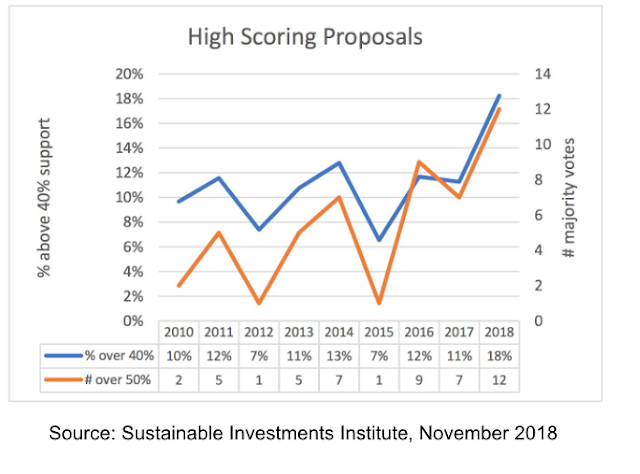Excerpt from REUTERS #BUSINESS NEWS
FEBRUARY 2, 2018 U.S. investor group concerned SEC decisions roll back proxy rights
Ross Kerber
BOSTON (Reuters) - A group representing large investors voiced concern that the U.S. Securities and Exchange Commission is undoing protections for shareholders to bring proxy resolutions opposed by management.
Ken Bertsch, executive director of the Council of Institutional Investors, said his group disagreed with recent SEC decisions allowing companies including electric utility AES Corp to craft their own rules on the right to call special investor meetings, in place of versions proposed by shareholders.
"AES is playing games with this," Bertsch said in a telephone interview late on Thursday, adding that existing guidance from the top U.S. securities regulator should have been enough to protect the resolutions.
The council, whose members include big pension funds and asset managers like BlackRock Inc and Vanguard Group, raised its concerns to the SEC directly in a Jan. 31 letter seen by Reuters.
Under Chairman Jay Clayton the SEC has taken steps seen as favoring businesses, such as allowing companies to confidentially file paperwork for initial public offerings. Clayton said at a November conference he hoped to reconcile concerns about the cost of shareholder resolutions with the corporate governance improvements they can bring about.
* * *
Shareholder resolutions have taken on a new importance as fund firms seek money from investors concerned about climate change and corporate governance.
The SEC has already taken steps that could raise the bar for filers, such as allowing more resolutions to be skipped as "ordinary business."
The [resolutions] were filed by independent investor John Chevedden. Both called for shareholders with at least 10 percent of shares to be able to call special meetings, which can put pressure on management.
The companies requested SEC permission to leave the proposals off their proxies. Each company said it planned instead to offer shareholders a resolution to set the special meeting threshold at 25 percent of shares, a higher standard that could protect executives and directors.
The SEC sided with AES in December, and with CF on Jan. 30, saying Chevedden's measures conflicted with the management proposals.
***
In an interview, Chevedden said shareholders could logically vote for both standards to see which had more support. Now, he said, shareholders would "only get to hear management's side."
Reporting by Ross Kerber in Boston; Additional reporting by Michelle Price in Washington; Editing by Richard Chang
Full article with links here:
https://www.reuters.com/article/us-usa-investors-proxyrights/u-s-investor-group-concerned-sec-decisions-roll-back-proxy-rights-idUSKBN1FM2JB




